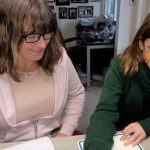Never Too Late
Russell Campbell is living proof that it’s never too late to get help for dyslexia. He had semi -retired before he finally found the courage and time to tackle his huge literacy problems. Russell says he now loves to read and write, no small feat after a lifetime of struggle.
“I had carefully tailored my life to avoid situations where I had to demonstrate reading and writing. I couldn’t even fill in a boarding pass. Now I’m so much more confident. My horizons are much broader. It’s a wonderful, rewarding and enriching thing to be able to communicate with the written word, particularly in our world of computerisation.”

Russell Campbell
Russell’s problems began at school which he describes a complete disaster.
“I couldn’t understand how I could not learn. I was called lazy and disruptive and got tremendously bullied.”
Despite his literacy issues, Russell knew he could understand far more than many other kids around him – especially when it came to taking apart machines and putting them back together again.
“I am really interested in the way a dyslexic’s memory works. I used to think I was mad. I couldn’t memorise my number plate yet I could pull a machine apart into a million pieces and then put it back together again, accounting for every screw and washer.”
Russell put these talents to good use after leaving school, doing fitter and turner apprenticeship and eventually established his own business servicing wood working machinery.
Russell’s business flourished until computerisation arrived. He couldn’t understand the computer controlling the machinery and ended up closing the business down.
Three years ago, Russell decided enough was enough with his literacy issues and took up one-on-one tutoring with SPELD NZ.
“My tutor was lovely. She would go along with what I found easiest and was flexible enough to work the magic with that. We all learn in different ways. Being client centred is really important.”
On his tutor’s recommendation, Russell also began a Cogmed computer-based training programme to help improve his working memory. He describes this as a “brain changing” experience.
Now he loves doing research on the internet and writing his own emails.
“People no longer pick up the phone. They email. If you can’t read or write and understand language fluently in the computer age, so many things are not accessible to you. You are really travelling quite blind.
Russell’s message to other adults with dyslexia is that you’re never too old to learn to read and write confidently.
“As we get older, it’s absolutely essential to keep our brains going. Doors can open because of it.”






